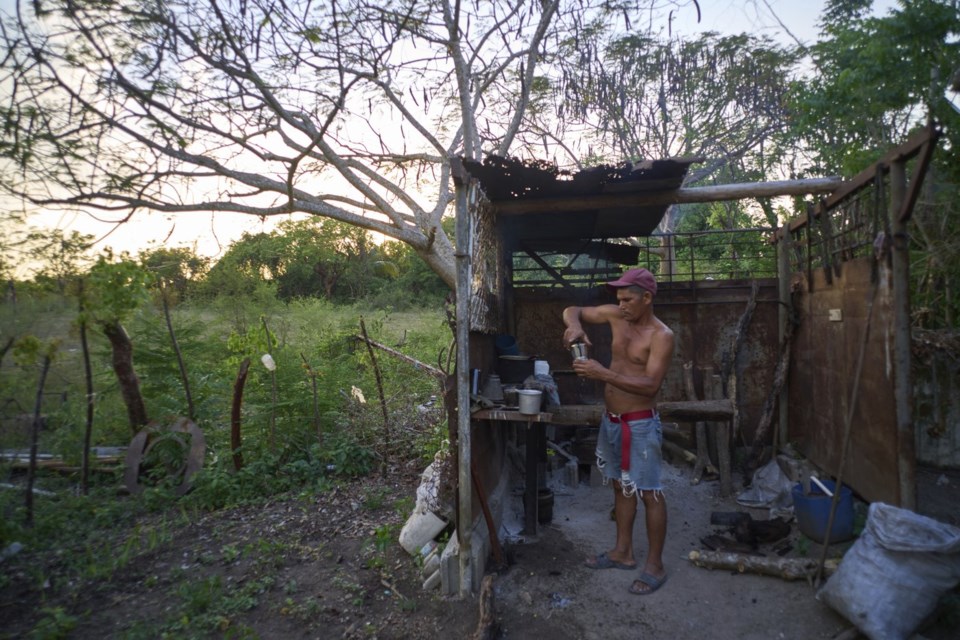HAVANA (AP) ã For MarylûÙn ûlvarez and her family, like countless other Cubans, the question is no longer if the power will go out, but when ã forcing them to implement ingenious alternatives to sustain daily life as the island undergoes its .
Since December, when the government stopped supplying their cooking gas, the family had relied on an electric burner ã until made that solution impractical.
ãThe blackouts are quite severe and, with gas in short supply, I have to be running around to get food on time," said ûlvarez, a 50-year-old cosmetologist living with her husband and two teenage daughters in the populous BahûÙa neighborhood in Havana.
But what happens when even the ã a reality for several days a month and often for hours each day? Thatãs when the familyãs ingenuity truly kicks in: with no gas and no power, they turn to their charcoal stove.
Leisure time also requires creative solutions. ûlvarez's husband, ûngel RodrûÙguez, an auto mechanic, found a way for the family to catch up on their beloved telenovelas even during blackouts. He ingeniously assembled a television using an old laptop screen and an electric motorcycle battery.
ãIt doesnãt last very long," RodrûÙguez said, ãbut itãs good enough for my family to watch TV or have some entertainment.ã
, a problem for months, have intensified in recent weeks due to persistent fuel shortages at power plants and aging infrastructure. With summer's rising demand approaching and no apparent solution in sight, families face a grim outlook.
ãWe do our best,ã ûlvarez said.
Cuban President recently acknowledged that power outages are among one of his governmentãs biggest challenges.
In the last eight months alone, Cuba has experienced four total blackouts, plunging the entire island into darkness.
Highlighting the nationãs severe energy deficit, DûÙaz-Canel said last week that while electricity demand soared from 2,580 megawatts in March to 3,050 in May, availability barely increased, rising only from 1,790 megawatts in March to around 1,900 these days.
The government has said that a plan to address the problem includes the installation of solar parks and repair its generators with the support from China and Russia. But little progress has been made so far.
In the meantime, Cubans must continue to find ways to navigate the crisis.
In the outskirts of Havana, 45-year-old blacksmith Edinector VûÀzquez is busier than ever, serving a growing clientele of less affluent families.
VûÀzquez makes charcoal stoves from metal scraps that he sells for around $18 ã the equivalent of a Cuban state workerãs monthly salary ã but he says he offers discounts to low-income families.
Natividad HernûÀndez, with slightly more resources than the BahûÙa neighborhood family, invested in solar panels, but her budget didnãt allow for installing batteries and other components, limiting their use to daytime hours and when thereãs some grid electricity.
As blackouts increase, Cuba's online shopping pages are inundated with ads for rechargeable fans, lamps with chargers and charging stations ã mostly imports from the United States and Panama ã making them unaffordable for many.
ãLack of oil, gas, and increased electricity consumption for cooking, combined with high summer temperatures and possible hurricanes ã not even a good Mexican soap opera can paint a more dramatic picture,ã said Jorge PiûÝû°n, a researcher at the University of Texas at Austinãs Energy Institute.
According to PiûÝû°n, solving Cuba's energy crisis would require ãthree to five years" and up to $8 billion.
Faced with this grim prospect, Cubans are not optimistic.
ãThis is difficult," said RodrûÙguez as he set up his rustic television and a soap operaãs first images flickered to life before his familyãs eyes.
ãThe time will come when we will run out of ideas.ã
____
Follow APãs coverage of Latin America and the Caribbean at
Andrea RodrûÙguez, The Associated Press



